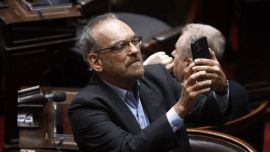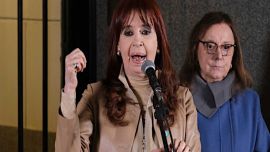The court which sentenced Vice-President Cristina Fernández de Kirchner to six years in prison and wants to ban her from holding political office for life says that the former head of state led a “criminal plan” of “state corruption” to favour allied businessman Lázaro Báez costing Argentina millions of pesos.
The declarations were made in a 1,600-page ruling released Thursday by the three judges of Federal Oral Court No. 2 who oversaw the so-called ‘Vialidad’ corruption trial which ended in convictions for Fernández de Kirchner and several other key former officials from her 2007-2015 governments.
The former president, who denies the allegations against her and dismissed the trial as a political witch-hunt, was found guilty of the crime of “fraudulent administration to the detriment of the state.”
The trio of judges concluded that Fernández de Kirchner favoured business tycoon Báez in the assignment of public works projects in her stronghold province of Santa Cruz. They rejected the charge that she ran a criminal organisation, which would have led to a more severe punishment.
"We are faced with an act of state corruption which as such undermines the legitimacy of public institutions, undermines society, moral order and justice as well as the integral development of peoples," wrote the magistrates.
Laying out their grounds, the judges said that “the magnitude of the criminal enterprise investigated here involved a magnificent planning and sophistication, in which different administrative levels acted with the same purpose."
For the judges, during the Kirchnerite era "a regime was consolidated giving the national road authority great liquidity and agility to make disbursements, with few bureaucratic processes ." The judges said that Báez "benefitted from differentiated and privileged treatment, thanks to the adoption of internal resolutions designed to suit him."
They concluded that the former president, along with Báez and ex-public works secretary José López had “planned, decided and executed” the scheme.
Fernández de Kirchner did not react to the publishing of the ruling, though sources briefed that she was reading the document at her home in Santa Cruz. The former president, 70, who enjoys immunity thanks to her role as vice-president of the nation and president of the Senate, was due to speak at a political rally on Friday in Río Negro, where supporters were expected to call on her to run for the presidency.
With the publication of the ruling, a 10-day window now opens for the defence and prosecution to appeal to the Federal Criminal Cassation Court in the first instance. The conviction and sentence remains unconfirmed, with the case likely to go all the way to the Supreme Court.
‘Promiscuous and corrupt’
The court’s magistrates, Jorge Gorini, Rodrigo Giménez Uriburu and Andrés Basso, said that the trial had exposed “extraordinary fraudulent manoeuvres” costing the state millions of pesos over the 12 years of Kirchnerite administrations.
"We can affirm that through the processing of 51 public bidding processes for the construction of road works on national and provincial routes in the province of Santa Cruz, between 2003 and 2015, an extraordinary fraudulent manoeuvre took place which harmed the pecuniary interests of the national public administration in the terms and conditions established by criminal law to enable a punitive response," said the court.
The works were "systematically awarded to a group of companies linked to the accused Lázaro Antonio Báez, a group whose formation and exponential economic growth was directly associated with the allocation of public road works in the area of that jurisdiction."For the judges, prosecutors Diego Luciani and Sergio Mola uncovered evidence of “the existence of promiscuous and corrupt links between officials of the public administration (national and provincial) and state contractors.”
Describing the alleged crimes as “an unprecedented event in the history of the country,” the court said the trial had “sufficiently proven that the strategy outlined between officials and businessmen was ensured through the issuing of administrative acts by the aforementioned agencies, always operating under a semblance of legality.”
The judges then went on to analyse the economic growth of the firms controlled by Lázaro Báez, who was also sentenced to six years in prison for his alleged crimes. Dismissing the businessman’s claim that he was a seasoned construction mogul when state contracts were awarded as “farcical,” they observed that at least one of his firms did not register any activity until July 2003 at the earliest.
Additionally, they observed that his flagship company Austral Construcciones was founded in 2003, only when it became clear that Néstor Kirchner would win the presidency. The firm was opened on May 8 of that year with an initial capital of 12,000 pesos, of which Báez contributed 3,000.
"The evidence shows that a few days before Néstor Carlos Kirchner won the elections that would allow him to become President of the Nation, Lázaro Báez constituted Austral Construcciones. From there and in a short time, he managed to position the firm as one of the largest companies dedicated to road construction at that time in the province of Santa Cruz," the judges said.
They wrote that there had been a clear “cartelisation of public road works" projects in Santa Cruz in favour of Báez and that the aim was to "deceitfully improve the chances of success of a single person.”
"In the province of Santa Cruz, Lázaro Báez was competing against himself," they concluded, adding that the damage to state coffers totalled (in net terms) more than 646 million pesos.
"It is clear that the bids made and awarded to the companies controlled by Lázaro Antonio Báez in 2006 were overpriced," the judges said, pointing to at least three road works projects that prosecutors claim were bumped up by 95 million pesos.
Illicit association charge
Finally, detailing their reasoning why they rejected the charge of “illicit association” against Fernández de Kirchner, judges Gorini and Giménez Uriburu argued that the investigated facts do not fit that definition because there was no "plurality of indeterminate criminal plans" and also in terms of "the number of people who were involved in the crime."
"We understand that in these proceedings the existence of an exclusive criminal purpose has not been accredited, since in a criminal society its members are associated by and for crime as the sole and exclusive purpose, while in this case the officials who were part of both the national and provincial state between 2003 and 2015 did so with the central objective of carrying out a prolonged and legitimate government activity (which does not exclude that in the execution of their policies criminal laws could not have been violated)," wrote the duo.
Expressing his dissent, Judge Basso argued that the former president should have been found guilty of running an illicit association.
“It has been demonstrated that before the imminent presidential inauguration of Néstor Carlos Kirchner, his friend Lázaro Antonio Báez, who until then had developed his professional activity in the banking sector reaching certain hierarchical positions set up the company Austral Construcciones SA and, with no experience in the field and only with the approval of those who commanded the political will of the country, he formed a business group that would eventually concentrate most of the public road works carried out in the orbit of the province of Santa Cruz, this in the period between 2003 and 2015".
"The illicit association attributed by the accusation, and which in this case I will consider proven, was set up for the purpose of illegitimately appropriating public funds and one of the methods implemented was through the road works financed with funds from the National Treasury and carried out in the province of Santa Cruz," added the judge in his minority opinion.
– TIMES/NA/PERFIL






















Comments